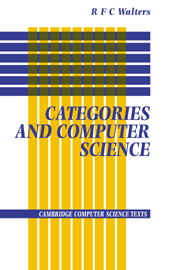Introduction
Published online by Cambridge University Press: 03 December 2009
Summary
It is always exciting and fruitful when two disparate scientific fields are found to have much in common. Each field is enriched by the different perspective and insights of the other. This has happened recently with category theory and theoretical computer science.
The relations between category theory and computer science constitute an extremely active area of research at the moment. Some evidence of this is given in the short list of references at the end of the book. Among the many places where research is being done are: Aarhus, Carnegie-Mellon, Cambridge, Edinburgh, Glasgow, London, Milan, Oxford, Paris, Pennsylvania, Pisa, Stanford, and Sydney. Topics of current interest include the connections between category theory and functional programming, polymorphism, concurrency, abstract data structures, object-oriented programming, and hardware design.
This book is an introduction to category theory in which several of the connections with computer science are discussed in sufficient detail to give the reader some technical expertise and a feeling for the rich possibilities arising from the happy connection between these two subjects.
What is category theory?
The notion of function is one of the most fundamental in mathematics and science. Functions are used to model variation — for example, the motion of a particle in space; the variation of a quantity like temperature over a space; the symmetries of a geometric object, or of physical laws; the variation of the state of a system over time.
Information
- Type
- Chapter
- Information
- Categories and Computer Science , pp. 1 - 2Publisher: Cambridge University PressPrint publication year: 1992
